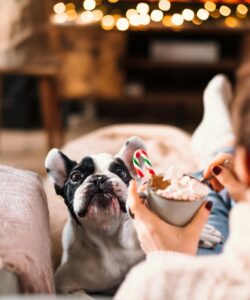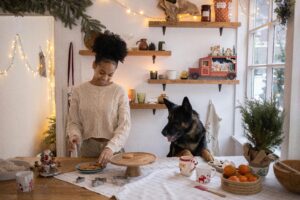 The holiday season can be very indulgent, with festive treats and delicious feasts filling homes. While sharing the joy of the holidays is natural, sharing your festive food with your furry friend can lead to serious health issues. Many holiday foods that are perfectly safe for humans can be dangerous or even life-threatening for dogs. Here’s a guide to holiday foods your dog should never eat and tips on managing food safety when you’re hosting guests.
The holiday season can be very indulgent, with festive treats and delicious feasts filling homes. While sharing the joy of the holidays is natural, sharing your festive food with your furry friend can lead to serious health issues. Many holiday foods that are perfectly safe for humans can be dangerous or even life-threatening for dogs. Here’s a guide to holiday foods your dog should never eat and tips on managing food safety when you’re hosting guests.
Holiday Foods That Are Dangerous for Dogs
- Chocolate
Chocolate is one of the most common holiday treats and also one of the most dangerous for dogs. It contains theobromine, which is toxic to dogs, especially in dark or baking chocolate. Even small amounts can cause symptoms like vomiting, diarrhea, rapid breathing, or seizures.
What to Do: Keep all chocolate treats, including candy, cookies, and hot chocolate mix, far out of reach of your dog. Be extra cautious during gatherings where chocolates may be left on tables or given as gifts.
- Mince Pies and Christmas Pudding
Mince pies and Christmas pudding are festive favorites but are incredibly toxic to dogs. They often contain raisins, sultanas, and currants, which can cause kidney failure in dogs, even in small quantities. Adding to the risk, these desserts may also contain alcohol, another dangerous ingredient for pets.
What to Do: Avoid leaving these items where your dog can access them, and let guests know they shouldn’t share a bite with your furry friend.
- Nuts
Not all nuts are toxic to dogs, but some, like macadamia nuts, can cause weakness, tremors, vomiting, and hyperthermia. Even non-toxic nuts can pose a choking hazard or lead to digestive issues due to their high-fat content, which can cause pancreatitis.
What to Do: Keep nut bowls out of reach and be mindful of any nut-based treats, such as brittle or nutty desserts, that may be left unattended.
- Artificial Sweeteners (Xylitol)
Xylitol, commonly found in sugar-free gums, candies, and baked goods, is highly toxic to dogs. It can cause a dangerous drop in blood sugar levels (hypoglycemia), leading to symptoms like weakness, vomiting, seizures, and even liver failure.
What to Do: Check labels on any sugar-free products and ensure they are stored securely. Be cautious about sharing any baked goods unless you’re 100% certain they don’t contain xylitol.
- Cooked Bones
While it might be tempting to share a bone from your holiday roast, cooked bones can splinter easily, causing choking, internal injuries, or blockages.
What to Do: Stick to dog-safe chews and avoid sharing bones from the table, no matter how tempting it may seem.
- Fatty Foods and Trimmings
Foods like turkey skin, bacon, and gravy are high in fat, which can upset your dog’s stomach and potentially lead to pancreatitis, a painful and serious condition.
What to Do: Resist the urge to share table scraps with your dog, especially fatty trimmings. Instead, provide them with a special dog-safe treat during the meal.
- Alcohol
Alcohol is highly toxic to dogs, and even small amounts can lead to vomiting, diarrhea, difficulty breathing, and central nervous system depression.
What to Do: Keep glasses of wine, beer, or cocktails well out of reach, and clean up any spills immediately to prevent accidental ingestion.
- Onions, Garlic, and Chives
Found in many holiday dishes, including stuffing, gravy, and casseroles, these ingredients are toxic to dogs and can cause damage to red blood cells, leading to anemia.
What to Do: Double-check the ingredients of any food you’re sharing with your dog to ensure it doesn’t contain these harmful items.
- Dairy Products
While not toxic to all dogs, many are lactose intolerant and can experience digestive upset if given dairy-based foods like cheese or cream.
What to Do: Avoid sharing dairy-heavy treats like cheesecakes or creamy desserts, and opt for lactose-free dog treats instead.
How to Manage Food Safety Around Guests
- Educate Your Guests
Let friends and family know which foods are harmful to dogs. Politely remind them not to feed your pet from the table, no matter how cute or persuasive your furry friend might be. - Set Up a Safe Zone
During meals or parties, create a dog-free zone around the dining area. This reduces the chance of your dog sneaking food or being handed something unsafe by a well-meaning guest. - Secure Trash Bins
Holiday trash is a treasure trove of dangers, from food scraps to packaging. Invest in a secure, dog-proof trash can to keep your pup safe. - Provide Dog-Safe Alternatives
Offer your dog their own festive treats to make them feel included. You can purchase special holiday-themed dog treats or bake your own using safe, dog-friendly ingredients like peanut butter (xylitol-free), pumpkin, and oats. - Keep Emergency Numbers Handy
Accidents can happen despite your best efforts. Keep the number for your local vet or an emergency animal clinic readily accessible, along with the number for a poison control hotline.
What to Do If Your Dog Eats Something Dangerous
If you suspect your dog has consumed a toxic food, act quickly:
- Identify the Food and Quantity: This helps your vet assess the situation more effectively.
- Call Your Vet Immediately: Provide as much detail as possible.
- Avoid Inducing Vomiting Without Guidance: Certain foods can cause more damage if brought back up. Always consult your vet first.

A Safe and Happy Holiday for All
The holidays are a time to celebrate and create memories with loved ones, including your four-legged family members. By being mindful of toxic treats and managing food safety, you can ensure a joyful and stress-free holiday season for everyone in your household. After all, a happy dog means a happy home!